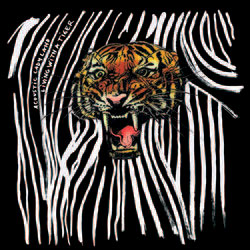When Acoustic Ladyland emerged with 2004’s Camouflage, they were primarily concerned with jazz re-workings of Hendrix covers – hence the awful name. The moniker has become increasingly inappropriate, however: their subsequent two albums moved a long way from Hendrix, as leader Pete Wareham flexed his compositional muscles and increasingly added punk vocals to his fierce, squawking sax lines.
The reasons were not hard to fathom: Wareham, in particular, seemed uncomfortable to find himself a broadsheet darling, hailed alongside the Mercury-nominated Polar Bear (in which he, drummer Seb Rochford and bassist Tom Herbert all moonlighted) as saviors of an increasingly senescent British jazz scene. If the vocals were part a bid to escape from the jazz ghetto, they certainly did the job, enabling a move to V2 for most recent album Skinny Grin. In fact, the singing had only one downside: it didn’t actually sound very good.
It’s a pleasant surprise, then, to discover that this fourth album, released on Wareham’s own label, features no vocals at all – and it’s far from the only change. Ruth Geller’s electric bass, which long ago replaced Herbert’s upright on stage, is finally captured on record, while Tom Cawley’s ivory-tickling is absent too. In its place we find ferocious electric guitar from new arrival Chris Sharkey, of "stadium improv band" Trio VD.
On the whole, these changes, presumably to some extent a reaction against their major label sojourn, are a resounding success. ‘Ladyland have long been dubbed "punk jazz" – track titles have namechecked Iggy Pop and The Ramones, and they once did a track with No Wave icon James Chance – but their attempts to marry undoubted technical virtuosity to punk’s here’s-three-chords-now-form-a-band ethos have not always been convincing.
Right from opener ‘Sport Mode’, however, it feels as though they’ve finally got the balance right, as the TV-theme-tune-from-another-dimension sax riff is semi-deconstructed by aggressive shards of guitar. After a quick reprise of the head melody, it’s over, all within two and a half minutes – and then ‘Glasto’ kicks in, sax riff just as catchy, rhythm section just as driving, overall vision just as distilled.
Most of the album continues in similar vein, often heavily riff-based and at times surprisingly simple both rhythmically and harmonically; though cacophony is, thankfully, never far away, there’s certainly no room for indulgent, noodling solos. Indeed, it seems like a culmination of the band’s long-running attempt to distance themselves from jazz altogether (witness Wareham’s insistence on talking about grime and dubstep at every opportunity – although apparently he’s into Deerhoof now too).
At times what feels like deliberate self-limitation can be frustrating, and it’s also true that the record ventures slightly further into 70s rock territory than common decency would normally countenance. Yet overall, the results are magnificent. Combining frequent hooks with genuine experimental tendencies, the four musicians flit between rigid discipline and total abandon, as on Wareham’s Ayleresque squealing on ‘Death By Platitude’. Particularly when played loud, bringing to the fore the full guttural impact of Sharkey’s phenomenal guitar playing, ‘Living With A Tiger’ is a triumph, and certainly mauls and makes a mockery of the "avant garde for people who don’t like the avant garde" tag with which the band is sometimes lumbered.


